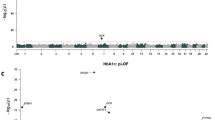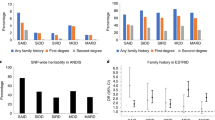Abstract
We studied genes involved in pancreatic β cell function and survival, identifying associations between SNPs in WFS1 and diabetes risk in UK populations that we replicated in an Ashkenazi population and in additional UK studies. In a pooled analysis comprising 9,533 cases and 11,389 controls, SNPs in WFS1 were strongly associated with diabetes risk. Rare mutations in WFS1 cause Wolfram syndrome; using a gene-centric approach, we show that variation in WFS1 also predisposes to common type 2 diabetes.
This is a preview of subscription content, access via your institution
Access options
Subscribe to this journal
Receive 12 print issues and online access
$209.00 per year
only $17.42 per issue
Buy this article
- Purchase on Springer Link
- Instant access to full article PDF
Prices may be subject to local taxes which are calculated during checkout
Similar content being viewed by others
References
Gloyn, A.L. et al. Diabetes 52, 568–572 (2003).
Nielsen, E.M. et al. Diabetes 52, 573–577 (2003).
Silander, K. et al. Diabetes 53, 1141–1149 (2004).
Love-Gregory, L.D. et al. Diabetes 53, 1134–1140 (2004).
Grant, S.F. et al. Nat. Genet. 38, 320–323 (2006).
Minton, J.A. et al. Diabetes 51, 1287–1290 (2002).
Inoue, H. et al. Nat. Genet. 20, 143–148 (1998).
Strom, T.M. et al. Hum. Mol. Genet. 7, 2021–2028 (1998).
Riggs, A.C. et al. Diabetologia 48, 2313–2321 (2005).
Ishihara, H. et al. Hum. Mol. Genet. 13, 1159–1170 (2004).
Karasik, A. et al. Diabetes Care 12, 135–138 (1989).
Yamada, T. et al. Hum. Mol. Genet. 15, 1600–1609 (2006).
Ozcan, U. et al. Science. 313, 1137–1140 (2006).
Altshuler, D. et al. Nat. Genet. 26, 76–80 (2000).
Acknowledgements
We thank all study participants. We acknowledge use of DNA from the British 1958 Birth Cohort collection, funded by the UK Medical Research Council (MRC) grant G0000934 and the Wellcome Trust grant 068545/Z/02. The Ashkenazi population was collected by the Israeli Diabetes Research Group, funded by the Russell Berrie Foundation, D-Cure, Diabetes Care in Israel, Israel Ministry of Health and an unrestricted research grant from Novo-Nordisk. The Wellcome Trust and Diabetes UK funded the Warren 2 study. The work on the Cambridgeshire case-control, Ely, ADDITION and EPIC-Norfolk studies was funded by support from the Wellcome Trust and MRC. We are grateful to S. Griffin, MRC Epidemiology Unit for assistance with the ADDITION study and to S. O'Rahilly and M. Sampson for their contribution to the Warren 2 study. The UK type 2 diabetes case/control collection (Go-DARTS2) was funded by the Wellcome Trust. C.N.A.P. and A.D.M. are supported by the Scottish Executive Chief Scientist's Office as part of the Generation Scotland initiative. Illumina genotyping was done by P. Deloukas's laboratory at the Wellcome Trust Sanger Institute. I. Blech. and K.A.F. are funded by the Wellcome Trust. I.B. acknowledges support from EU FP6 funding (contract number LSHM-CT-2003-503041). A.T.H. is a Wellcome Trust Research Leave Fellow. M.N.W. is a Vandervell Foundation Research Fellow. S.L.D. is funded by the British Heart Foundation. None of the sponsors or funders had any role in the design and conduct of the study, in the collection, analysis and interpretation of the data or in the preparation, review or approval of the manuscript.
Author information
Authors and Affiliations
Contributions
I. Barroso, A.T.H., M.A.P., N.J.W. and M.S.S. designed this study; M.S.S. did the statistical analysis, supported by I. Barroso, A.D., S.L.D., K.A.F., H.L., R.J.N., P.D.P., R.S. and M.N.W. M.S.S. wrote the manuscript with I. Barroso, S.L.D. and K.A.F.; A.D. conducted the bioinformatic analysis; I. Blech., S.L.D., K.A.F. and C.K. arrayed and genotyped the replication studies; B.G., A.T.H., G.H., C.K., A.D.M., M.I.M., C.N.A.P., M.W., R.T., J.W. and N.J.W. provided study samples and all authors contributed to data interpretation and commented on the final manuscript.
Corresponding authors
Ethics declarations
Competing interests
The authors declare no competing financial interests.
Supplementary information
Supplementary Text and Figures
Supplementary Figures 1–2, Supplementary Tables 1–4, Supplementary Methods (PDF 377 kb)
Rights and permissions
About this article
Cite this article
Sandhu, M., Weedon, M., Fawcett, K. et al. Common variants in WFS1 confer risk of type 2 diabetes. Nat Genet 39, 951–953 (2007). https://doi.org/10.1038/ng2067
Received:
Accepted:
Published:
Issue Date:
DOI: https://doi.org/10.1038/ng2067
This article is cited by
-
WFS1 functions in ER export of vesicular cargo proteins in pancreatic β-cells
Nature Communications (2021)
-
Modeling different types of diabetes using human pluripotent stem cells
Cellular and Molecular Life Sciences (2021)
-
Wolfram syndrome 1 gene regulates pathways maintaining beta-cell health and survival
Laboratory Investigation (2020)
-
Targeting Glycoproteins as a therapeutic strategy for diabetes mellitus and its complications
DARU Journal of Pharmaceutical Sciences (2020)
-
Population attributable fractions for Type 2 diabetes: an examination of multiple risk factors including symptoms of depression and anxiety
Diabetology & Metabolic Syndrome (2018)



